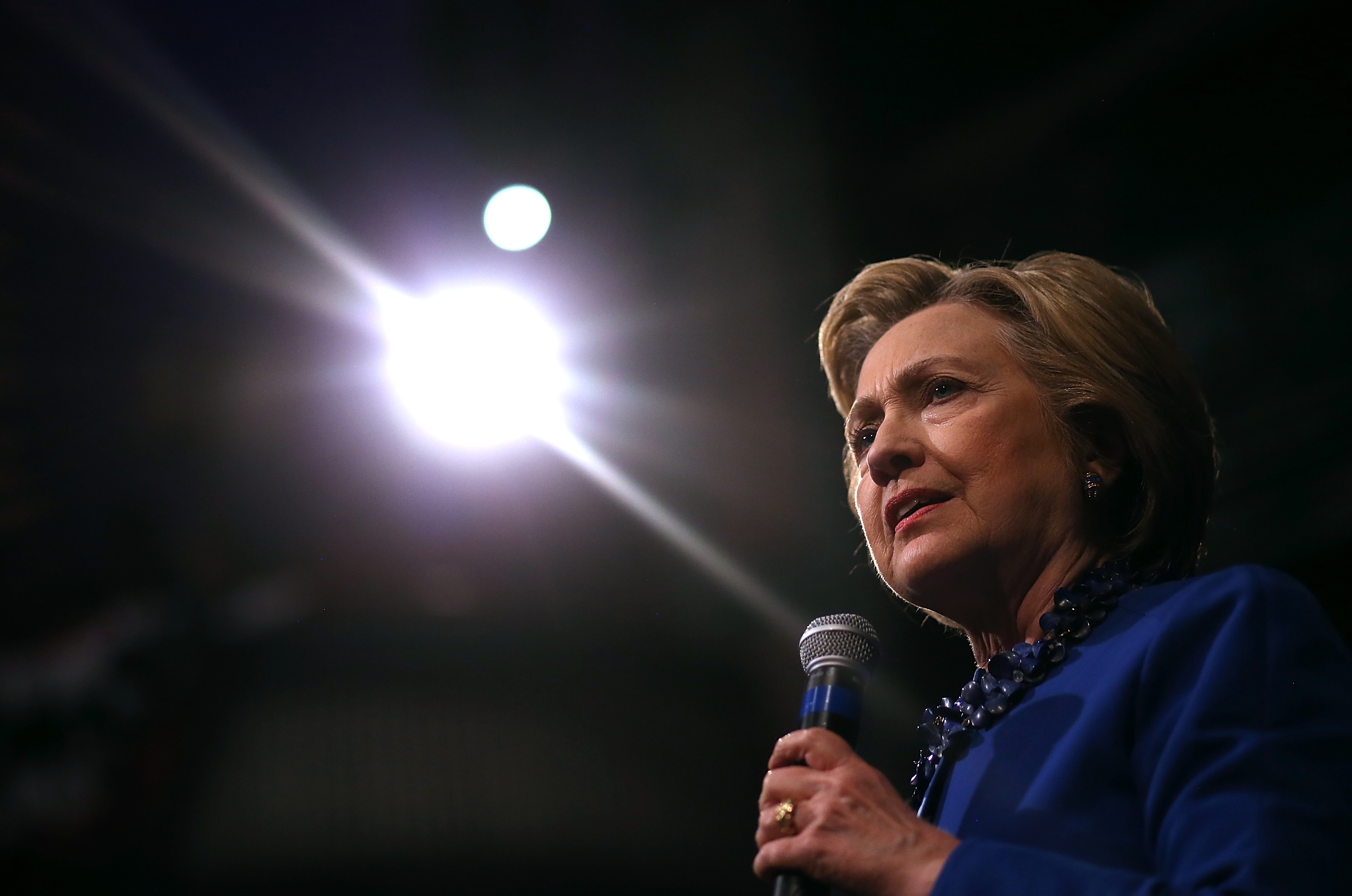What Clinton should really fear about Trump
And what she can safely ignore


Having internally conceded West Virginia to Bernie Sanders Tuesday, Hillary Clinton's presidential campaign may have gotten an unexpected jolt from an exit poll result.
Forty-four percent of those voting for Sanders told the surveyists that they'd vote for Republican Donald Trump over Hillary Clinton in the fall.
So eye-opening was that statistic that at least two news organizations flashed it to the world as breaking news. It appears to confirm the worst fears of Democrats who support Clinton — that she is far too beatable in the fall — and, of course, reifies the standard rationale for Sanders' continued presence in the race.
The Week
Escape your echo chamber. Get the facts behind the news, plus analysis from multiple perspectives.

Sign up for The Week's Free Newsletters
From our morning news briefing to a weekly Good News Newsletter, get the best of The Week delivered directly to your inbox.
From our morning news briefing to a weekly Good News Newsletter, get the best of The Week delivered directly to your inbox.
Fortunately, Team Clinton can take comfort: This particular exhibit of agita in the electorate is not something that will doom her in the fall. Then, after taking comfort, they can start to focus on stuff that really ought to sober them up.
Here's what Clinton ought to be afraid of — and what she can safely ignore.
First, that stat. Don't sweat it.
The Democratic electorate in West Virginia is quite conservative. It was quite offended by Clinton's correct, if impertinently expressed jibes at the demise of coal country. ("We're going to put a lot of coal miners and coal companies out of business.") As ABC News summarized the primary electorate: "The highest level of economic concern in any Democratic primary this year and greater-than-usual turnout among men, whites, political independents, and critics of President Obama characterized Hillary Clinton's challenges in the West Virginia primary." A majority of voters had a negative view of trade; a third of all voters are directly tied to the coal industry and they overwhelmingly voted for Sanders, who is a free trade skeptic. If there was a state Clinton deserved to lose, it was West Virginia.
A free daily email with the biggest news stories of the day – and the best features from TheWeek.com
Simply put, that state will continue to undergo wrenching change — most of it unrelated to trade, some of it related to the Democratic emphasis on renewable energy sources — regardless of who becomes president.
But Clinton should worry about the economically aggrieved within her own party — in many other states, close to half of Democratic primary voters felt that the Obama economy had left them behind. They might not identify it as such, but it's a particular challenge for Clinton: She must embrace Obama and his policies without seeming tone deaf to the much larger structural challenges that have set back American workers and continue to drag down their perceptions about their economic futures.
She shouldn't worry about Obama himself, though. And she shouldn't truly worry that Bernie Sanders' supporters in other states will vote for Donald Trump en masse. Nothing would be more — let me put it simply — contrary to their self-interest, and they know it.
In this age of meta-media, we might be inclined to tell exit pollsters what we think the opposing candidate might need to hear. Nothing registers a protest as loudly as a Sanders liberal promising to vote for Donald Trump.
But Trump, even with his recent bleats about raising taxes on the rich, will not win by courting liberals, or by adopting their policies. As the Republican Party coalesces around him, he is much more likely to fall back onto orthodox Republican economic policies, while Clinton has already been pulled to the left by Sanders and is promising some hefty new purchases for disaffected voters.
Clinton should not worry, generically, about Donald Trump's appeal to women. She should worry very specifically about a charge he will make: Trump said this weekend, and has said repeatedly, that Bill Clinton "is fair game." That means his personal peccadillos are "fair game." That means, specifically for Hillary Clinton, that the women who accused Clinton of sexual misconduct will find their charges given a second airing by Trump. Trump will accuse Hillary Clinton of using her power and stature to bury these women — to prevent them from getting a fair shot at justice. He will do this repeatedly; he will do this loudly. Clinton must have an efficient and effective response for this charge.
Clinton should not worry about pundits who like to say that this election will feature the two most unpopular nominees in the history of polling. A good president need not be popular, and Trump has no solid plan to emerge from his abyss of negative attributes. Clinton is polling at her lowest, thanks to a bruising primary. She will become less disliked as these numbers stabilize.
But she should worry if she lets these concerns get in the way of her making the race a big one. By that I mean: Every tactic, proposal, policy maneuver, vector, change — all should be on the table. She must treat Donald Trump as if he were an imminent threat to the country. She cannot run the race as a frontrunner. She cannot rest on mathematics of the electoral map, which are broadly in her favor, but which could flip on a dime. She cannot be cautious about losing what she's built already. Trump has nowhere to go but up; his ability to master the media frustrates her campaign, but instead of complaining about it, they must figure out how to beat it back.
Marc Ambinder is TheWeek.com's editor-at-large. He is the author, with D.B. Grady, of The Command and Deep State: Inside the Government Secrecy Industry. Marc is also a contributing editor for The Atlantic and GQ. Formerly, he served as White House correspondent for National Journal, chief political consultant for CBS News, and politics editor at The Atlantic. Marc is a 2001 graduate of Harvard. He is married to Michael Park, a corporate strategy consultant, and lives in Los Angeles.
-
 How space travel changes your brain
How space travel changes your brainUnder the Radar Space shifts the position of the brain in the skull, causing orientation problems that could complicate plans to live on the Moon or Mars
-
 How Iran protest death tolls have been politicised
How Iran protest death tolls have been politicisedIn the Spotlight Regime blames killing of ‘several thousand’ people on foreign actors and uses videos of bodies as ‘psychological warfare’ to scare protesters
-
 Departure(s): Julian Barnes’ ‘triumphant’ final book blends fact with fiction
Departure(s): Julian Barnes’ ‘triumphant’ final book blends fact with fictionThe Week Recommends The Booker prize-winning novelist ponders the ‘struggle to find happiness and accept life’s ending’
-
 The billionaires’ wealth tax: a catastrophe for California?
The billionaires’ wealth tax: a catastrophe for California?Talking Point Peter Thiel and Larry Page preparing to change state residency
-
 Bari Weiss’ ‘60 Minutes’ scandal is about more than one report
Bari Weiss’ ‘60 Minutes’ scandal is about more than one reportIN THE SPOTLIGHT By blocking an approved segment on a controversial prison holding US deportees in El Salvador, the editor-in-chief of CBS News has become the main story
-
 Has Zohran Mamdani shown the Democrats how to win again?
Has Zohran Mamdani shown the Democrats how to win again?Today’s Big Question New York City mayoral election touted as victory for left-wing populists but moderate centrist wins elsewhere present more complex path for Democratic Party
-
 Millions turn out for anti-Trump ‘No Kings’ rallies
Millions turn out for anti-Trump ‘No Kings’ ralliesSpeed Read An estimated 7 million people participated, 2 million more than at the first ‘No Kings’ protest in June
-
 Ghislaine Maxwell: angling for a Trump pardon
Ghislaine Maxwell: angling for a Trump pardonTalking Point Convicted sex trafficker's testimony could shed new light on president's links to Jeffrey Epstein
-
 The last words and final moments of 40 presidents
The last words and final moments of 40 presidentsThe Explainer Some are eloquent quotes worthy of the holders of the highest office in the nation, and others... aren't
-
 The JFK files: the truth at last?
The JFK files: the truth at last?In The Spotlight More than 64,000 previously classified documents relating the 1963 assassination of John F. Kennedy have been released by the Trump administration
-
 'Seriously, not literally': how should the world take Donald Trump?
'Seriously, not literally': how should the world take Donald Trump?Today's big question White House rhetoric and reality look likely to become increasingly blurred
